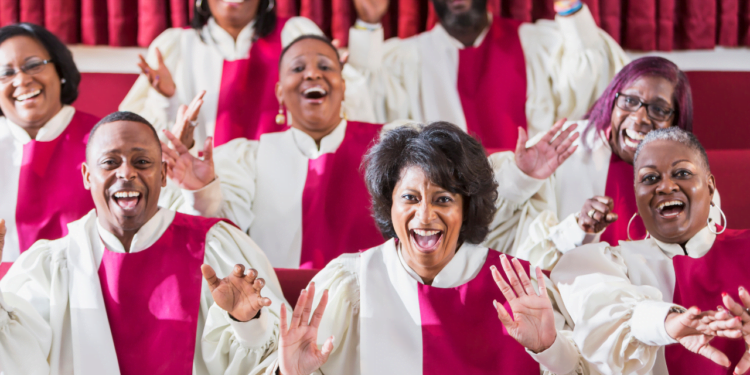No products in the cart.
Black Women’s Diverse Perspectives on Religion and Spirituality
This post contains paid and/or affiliate links. I make a small commission at no extra cost to you. Please see our Privacy Policy.
Black women have always held a multifaceted relationship with religion and spirituality, often navigating a complex landscape of beliefs, traditions, and personal experiences that shape their faith journey.
This journey is deeply personal and unique to each individual, reflecting diverse perspectives and understandings of the divine. From traditional religious practices to more unconventional spiritual beliefs, Black women find themselves at the intersection of culture, tradition, and modernity when defining their faith.
Spirituality vs. Religion: Breaking Down Labels
The distinctions between spirituality and religion significantly affect how Black women perceive and engage with their faith. While religion often embodies organized practices, rituals, and doctrines within a specific institution, spirituality is more inward-focused, emphasizing a personal connection to the divine or higher power.
For many Black women, identifying as “spiritual” rather than “religious” can be a way to express their individuality, autonomy, and freedom from the constraints of traditional religious structures. This shift in labeling highlights a growing trend toward seeking a more personal and holistic approach to faith.
Embracing Ancestral Traditions: Connecting to the Past
An essential aspect of Black women’s relationship with religion and spirituality is honoring their ancestral traditions and practices. Drawing on the wisdom and spirituality of their foremothers, many Black women find solace, strength, and guidance in connecting with the spiritual legacies passed down through generations.
From African diasporic religions like Yoruba or Vodou to Christian denominations with deep cultural roots, embracing ancestral traditions offers a profound sense of belonging and continuity in a world that often overlooks or marginalizes Black spiritual experiences.
Questioning Patriarchal Structures: Challenging The Status Quo
As Black women navigate their faith journey, they often find themselves questioning and challenging patriarchal structures within religious institutions. From male-dominated leadership hierarchies to rigid gender norms and interpretations of sacred texts, many Black women strive to carve out spaces within their faith communities that empower and uplift their voices.
By reimagining the divine in more inclusive and egalitarian terms, Black women are reshaping the narrative of what it means to be a spiritual being in a world marked by systemic inequities and injustices.
Healing and Liberation: Finding Wholeness in Spirituality
For many Black women, spirituality is a pathway to healing, liberation, and self-discovery. In a society that often perpetuates harmful stereotypes and narratives about Blackness, spirituality offers a source of inner strength, resilience, and empowerment.
Through meditation, ritualistic healing, and community building, Black women create sacred spaces to nurture their minds, bodies, and spirits. This holistic approach to spirituality fosters personal growth and contributes to collective healing and transformation within their communities.
Embracing Complexity: Navigating Faith With Grace
Ultimately, Black women’s diverse perspectives on religion and spirituality reflect a deep commitment to authenticity, self-determination, and resilience in adversity.
By embracing the complexities of their faith journey, Black women navigate the intersections of race, gender, and spirituality with grace and wisdom, challenging conventional norms and pushing boundaries to redefine what it means to be spiritual beings in a rapidly changing world.
Through their unique blend of tradition and innovation, Black women continue to inspire and illuminate new pathways toward spiritual wholeness and liberation.
Historical Influences Shaping Black Women’s Faith Identities
Black women’s faith identities have been intricately woven by historical influences, creating a tapestry of spirituality that reflects resilience, strength, and a deep connection to the divine. Understanding Black women’s complex relationship with their faith requires delving into the historical roots that have shaped their religious experiences.
The Legacy of Slavery
The legacy of slavery in the United States profoundly impacted the religious beliefs of Black women. During slavery, Christianity was often used as a tool for control and oppression.
Despite this dark history, many Black women found solace in the Bible’s stories of liberation and hope. Blending African spirituality with Christian teachings gave rise to unique expressions of faith centered on liberation, justice, and community.
The Civil Rights Movement
The Civil Rights Movement of the 1960s played a pivotal role in shaping Black women’s faith identities. Women like Fannie Lou Hamer and Ella Baker brought their religious convictions to the forefront of the fight for racial equality. Their faith fueled their activism, inspiring them to challenge societal norms and work towards a more just society.
The spiritual songs and prayers that echoed through the streets during this time symbolized the intersection of faith and social justice for Black women.
Womanist Theology
The emergence of womanist theology in the late 20th century provided a framework for Black women to explore the intersection of gender, race, and faith. Womanist scholars like Dr. Katie Cannon and Dr. Emilie Townes offered new theological perspectives centered on Black women’s experiences. By incorporating the voices and stories of Black women into religious discourse, womanist theology validated their unique spiritual journeys.
Healing and Wholeness
For many Black women, spirituality is a source of healing and wholeness in the face of societal challenges and personal struggles. Prayer, meditation, and communal worship provide a space for connection with the divine and others. The concept of self-care within Black women’s spirituality emphasizes the importance of tending to one’s spiritual, emotional, and physical well-being.
Embracing Complexity
Navigating the complexities of religion and spirituality, many Black women identify as spiritual rather than adhering to a specific religious label. This fluid approach to faith allows for personal interpretation and exploration while honoring the diverse cultural and historical influences that have shaped their beliefs.
The freedom to define one’s faith outside traditional boundaries is a testament to the resilience and creativity of Black women in expressing their spirituality.
The historical influences on Black women’s faith identities have been profound and multifaceted. From the legacy of slavery to the rise of womanist theology, Black women have forged unique spiritual paths that reflect their strength, resilience, and commitment to justice. By embracing the complexities of their faith experiences and reclaiming their narratives, Black women continue to shape the landscape of spirituality in powerful and transformative ways.
Intersectionality of Race, Gender, and Spirituality in Black Women’s Lives
Black women navigate a unique and intricate relationship with religion, spirituality, and the labeling of their faith that is deeply rooted in intersectionality. This intersectionality encompasses race, gender, and spirituality, profoundly shaping Black women’s experiences and beliefs.
Complexities of Identity
Black women often find themselves at the intersection of various identities, including their race, gender, and spiritual beliefs. These intersections influence their experiences, perspectives, and how they navigate the world. The interplay of these factors creates a complex tapestry of identity that cannot be separated or understood in isolation.
Historical Context
The historical context of Black women’s spirituality is crucial in understanding their current relationship with religion and spirituality. From the days of slavery, where their African spiritual practices were often suppressed, to the role of Black churches in the civil rights movement, spirituality has always been a cornerstone of Black women’s lives. This history influences how Black women view and practice their faith today.
Liberation Theology
Many Black women find solace and empowerment in liberation theology, emphasizing liberation from social, political, and economic oppression. This theological perspective resonates deeply with the experiences of Black women, who have historically faced marginalization and systemic injustices. Liberation theology provides a framework for Black women to reconcile their faith with their quest for justice and equality.
Reclaiming Spiritual Autonomy
For Black women, the journey toward spiritual autonomy often involves reclaiming and redefining traditional religious and spiritual practices. This process may involve incorporating elements of African spirituality, embracing non-traditional forms of worship, or rejecting labels that do not fully resonate with their experiences. By doing so, Black women assert their agency and autonomy in faith and spirituality.
Challenges of Labeling
Labeling one’s faith can be particularly fraught for Black women. Traditional labels may not fully capture the nuances of their beliefs and experiences, leading many to identify as “spiritual but not religious.” This label allows for a more personalized and fluid approach to spirituality, free from the constraints of organized religion.
Healing and Wholeness
Spirituality plays a significant role in the healing and wholeness of Black women. It serves as a source of strength, resilience, and community support in the face of adversity. By embracing their spirituality on their terms, Black women find pathways to healing that honor their unique experiences and identities.
Embracing Fluidity
Ultimately, Black women’s relationship with religion and spirituality is fluid and evolving. As they navigate the intersections of race, gender, and spirituality, Black women continuously redefine and reshape their faith to align with their lived experiences. This fluidity reflects their resilience and adaptability in complex societal challenges.
Challenges Faced by Black Women in Religious Spaces
Black women often find themselves navigating complex and multifaceted relationships with religion, spirituality, and the labels that define their faith. This intricate dance between personal beliefs and organized religion presents unique challenges and opportunities for growth within the Black community.
The Intersection of Race and Faith
The intersection of race and gender shapes the experiences of Black women in religious spaces. Historically, Black women have played pivotal roles in sustaining and shaping religious communities, often finding strength and solace in their faith traditions. However, they have also faced marginalization and erasure within institutionalized religious settings.
Upholding Cultural Traditions
For many Black women, spirituality upholds cultural traditions and connects them with ancestral roots. Practices such as rootwork, ancestral veneration, and conjure traditions have long been integral to the spiritual landscape of Black communities, offering a sense of continuity and resilience in the face of oppression.
Navigating White-Dominated Spaces
In predominantly white religious spaces, Black women often grapple with feelings of alienation and invisibility. The Eurocentricity of mainstream religious practices can undermine the unique spiritual experiences of Black women, leading many to seek out alternative forms of worship that resonate with their cultural identities.
Liberation Theology and Activism
Liberation theology has emerged as a powerful framework through which Black women can reconcile their faith with social justice activism. Drawing on the legacies of figures like Sojourner Truth and Harriet Tubman, Black women reclaim Christianity as a tool for resistance and liberation, challenging oppressive power structures within and outside religious institutions.
Deconstructing Patriarchal Narratives
Many Black women are engaged in the ongoing work of deconstructing patriarchal narratives that have historically subjugated them within religious contexts. By entering their own experiences and interpretations of sacred texts, Black women are reclaiming agency over their spiritual lives and reshaping the discourse around gender and faith.
Embracing Fluidity and Self-Definition
In response to the limitations of rigid religious frameworks, an increasing number of Black women are embracing fluidity and self-definition in their spiritual practices. By rejecting binary categories and embracing a more expansive understanding of faith, Black women cultivate personal connections to the divine that transcend traditional boundaries.
Navigating the complex terrain of religion, spirituality, and faith labeling is a deeply personal journey for Black women. By honoring their cultural legacies, challenging oppressive structures, and embracing fluid forms of spiritual expression, Black women are forging new paths of authenticity and empowerment within religious spaces.
Empowerment Through Spiritual Practices among Black Women
Black women have long played a significant role in spirituality and religion, utilizing various practices to empower themselves and their communities.
Spirituality in Black Women’s Lives
Spirituality holds a central place in the lives of many Black women, offering a source of strength, resilience, and connection to their cultural roots. Through spiritual practices, Black women often find empowerment, healing, and a sense of belonging in a world that may not always value their voices and experiences.
Historical Roots of Spiritual Empowerment
The history of spiritual empowerment among Black women is deeply intertwined with the legacy of resilience and resistance against oppression. From the days of slavery, where spirituals and communal worship provided solace and hope, to the Civil Rights Movement, where faith leaders like Fannie Lou Hamer and Ella Baker played pivotal roles, spirituality has been a driving force for empowerment.
Embracing Ancestral Wisdom and Traditions
Many Black women draw strength from ancestral wisdom and traditions passed down through generations. Practices such as honoring ancestors, engaging in rituals rooted in African spirituality, and connecting with nature are ways Black women reclaim their power and heritage.
Healing and Self-Care Through Spiritual Practices
In a society that often marginalizes and overlooks the experiences of Black women, spiritual practices serve as a form of healing and self-care. Meditation, prayer, yoga, and energy work are tools that many Black women utilize to nurture their mental, emotional, and spiritual well-being.
Community Building and Collective Empowerment
Spirituality among Black women is not solely an individual pursuit but a communal one. Black women unite to uplift and empower each other by forming sacred sister circles, participating in spiritual retreats, and organizing social justice initiatives grounded in faith.
Navigating Intersectionality in Spirituality
Black women’s relationship with spirituality is complex and often intersects with various aspects of their identities, such as race, gender, sexuality, and socio-economic status. This intersectionality shapes their spiritual experiences and influences how they navigate faith, religion, and self-discovery issues.
Redefining Labels and Embracing Diverse Belief Systems
As society becomes more inclusive and diverse, Black women are redefining traditional labels of faith and spirituality. Many are exploring non-traditional belief systems, blending elements of different religions, or identifying as spiritual but not religious, paving the way for a more expansive and inclusive understanding of spirituality.
The empowerment of Black women through spiritual practices is a multifaceted and deeply personal journey that encompasses healing, community building, ancestral reverence, and the reclamation of power. By embracing their spirituality and honoring their diverse belief systems, Black women continue to forge paths of strength, resilience, and empowerment for themselves and future generations.
Black women’s relationships with religion and spirituality are incredibly diverse, shaped by a complex interplay of history, culture, and personal experience. Their spiritual journeys are marked by resilience, empowerment, and a deep connection to ancestral traditions.
Despite facing challenges in religious spaces, many Black women find strength and solace in their spiritual practices, using them as guidance and empowerment. Creating inclusive and affirming spaces within religious communities is essential to support Black women on their spiritual paths and celebrate the diversity of their beliefs and practices.















